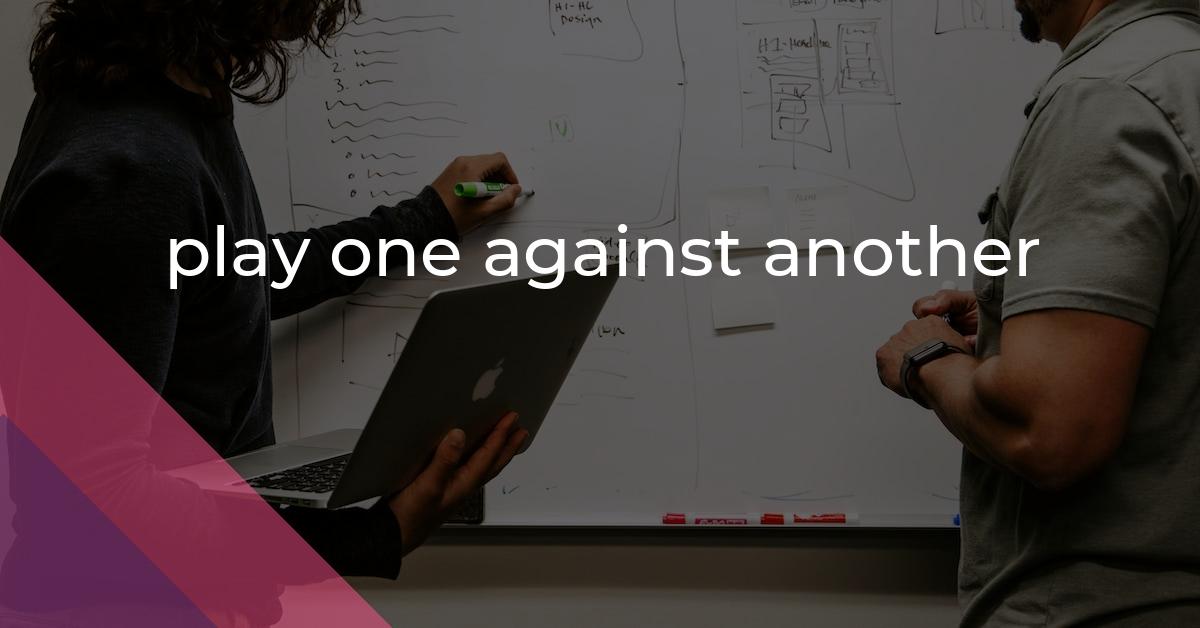play one against another: Idiom Meaning and Origin
What does ‘play one against another’ mean?
The idiom "play one against another" means to manipulate or exploit two or more people or groups by creating conflict or competition between them for personal gain.

Idiom Explorer
The idiom "put one over" means to deceive or trick someone in a clever or sneaky way.
The idiom "play with fire" means to engage in a dangerous or risky activity, often knowing the potential consequences but still proceeding anyway.
"Play to win" is an idiom that means to engage in a situation or activity with the intention of achieving victory or success, rather than just participating or going through the motions. It emphasizes the importance of being competitive and putting forth one's best effort to achieve a specific goal or outcome.
The idiom "play the victim card" means to intentionally act like a victim in order to gain sympathy or to avoid taking responsibility for one's actions.
The idiom "play the race card" refers to the act of using one's race as a means to gain advantage in a situation or to deflect criticism by accusing others of racism.
The idiom "play the man and not the ball" means to focus on attacking or criticizing someone personally instead of addressing the issue at hand. It implies a diversion from the main point of the argument and resorting to personal attacks instead.
The idiom "play the gender card" means to use one's gender as a way to gain advantage or manipulate a situation, typically in an unfair or strategic manner.
The idiom "play the angles" means to use clever or strategic tactics to achieve a desired outcome or advantage.
The idiom "play someone like a fiddle" means to manipulate or control someone skillfully, often for personal gain or amusement.
Fanning Rivalry
In the idiom "play one against another," the word "play" is used metaphorically to mean manipulate or use one person or group against another. The phrase suggests a strategic action or maneuver to create conflict, rivalry, or competition between two parties for one's own benefit. This idiom is often employed in situations where someone exploits the differences or disagreements between two individuals or groups to their advantage.
The idiom "play one against another" is commonly used in both informal and formal contexts, and it can be applied to various scenarios. It is often used to describe situations where a third party intentionally stokes or encourages disagreements between two other parties in order to gain some advantage, whether it be financial, political, or personal.
This idiom can also be associated with manipulative tactics used by individuals who aim to achieve their own goals or agendas by pitting others against each other. It suggests a sense of cunning or strategizing, often involving a level of deceit or trickery in influencing the parties involved.
Historically, the origins of the idiom "play one against another" can be traced back to ancient times when rulers and leaders would employ divisive strategies to maintain control or gain power. Throughout history, manipulative leaders have sought to maintain their influence by exploiting disagreements or rivalries among their subjects or potential adversaries.
In modern times, the idiom continues to be relevant as it captures the essence of strategic manipulation and conflict creation. This idiom serves as a reminder of the potential consequences of allowing oneself to be pitted against others, as it often leads to the exploitation and manipulation of individuals or groups.
Understanding the implications of the idiom "play one against another" is essential in recognizing and navigating situations where interpersonal dynamics may be utilized for personal gain. While the idiom offers insights into human behavior and motivations, it also serves as a cautionary tale about the potential dangers of allowing oneself to be played off against others.
The idiom "play both sides against the middle" is closely related to "play one against another." It refers to a similar manipulation tactic where a person or entity creates conflict or disagreement between two opposing parties, while positioning themselves as a mediator or neutral party. By exploiting differences and tensions, the manipulator is able to maintain control or gain an advantageous position.
Similarly, the idiom "pit against" aligns with the concept of playing one against another. It describes the act of setting two individuals or groups in competition or conflict with each other, often for one's own benefit. This can involve instigating or amplifying disagreements, rivalries, or animosity between the parties, thereby manipulating the situation to advance one's own interests.
The idiom "play games" also relates to the idea of playing one against another. It signifies engaging in manipulative tactics or strategies to achieve a desired outcome. This can involve deceit, trickery, or cunning in order to gain an advantage over others. By playing games, individuals or entities aim to manipulate situations or people to their own benefit, often at the expense of others.
Overall, the idiom "play one against another" encompasses the use of manipulative tactics to create conflict, rivalry, or competition between two parties. It highlights the potential dangers and consequences of allowing oneself to be influenced or exploited by others. By understanding this idiom and its related idioms - "play both sides against the middle," "pit against," and "play games" - individuals can become more aware of manipulative tactics and strive to foster constructive relationships based on trust and cooperation.
Example usage
Examples of how the idiom *play one against another* can be used in a sentence:
- John is trying to play his two friends against each other so that he can gain an advantage in their ongoing dispute.
- The politician is known for playing different interest groups against one another in order to secure their support and divide their influence.
- The salesperson is skilled at playing potential buyers against each other to create a sense of competition and drive up prices.
These examples illustrate situations where someone manipulates or exploits different individuals or groups by pitting them against each other for their own benefit. The idiom implies a deliberate strategy of creating conflict or competition in order to achieve one's own objectives.
More "Manipulation" idioms



